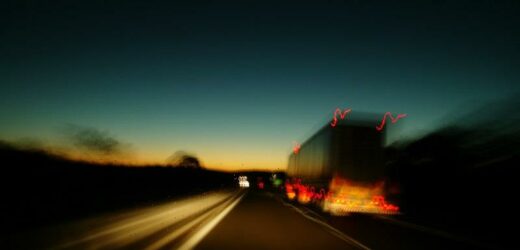For our free coronavirus pandemic coverage, learn more here.
The Victorian Transport Association says thousands of truck drivers are crossing the state’s border each day without a permit and shunning testing requirements designed to shield against the NSW coronavirus outbreak.
The peak industry body estimates between 15,000 and 19,000 trucks are entering Victoria daily, the vast majority from NSW. A Victorian government spokesperson said there were 9800 valid permit holders.
Transport industry groups want less onerous COVID-19 tests for drivers, but health experts warn they are less accurate. Credit:Andrew Quilty
The warning came as Victoria emerged from a 12-day lockdown at midnight on Tuesday, and South Australia’s lockdown also ended. But NSW recorded 172 locally acquired cases of coronavirus on Tuesday and Premier Gladys Berejiklian was set to extend her state’s strict confinement for another four weeks.
Under the Victorian government’s freight permit scheme, drivers are required to get a COVID-19 test every three days.
Victorian Transport Association chief executive Peter Anderson said drivers had complained of difficulty parking large vehicles near testing sites and that long queues meant drivers were getting tested outside working hours, reducing rest time and increasing fatigue. Others complained of skin abrasions and bleeding noses caused by frequent testing.
The transport associations of each state wrote to the federal government this week proposing less invasive – but less accurate – rapid antigen tests for drivers to increase compliance and stop drivers flouting the rules. They want the Australian Health Protection Principal Committee to agree to a national scheme to be taken up by all states.
Victorian Transport Association chief Peter Anderson. Credit:Jessica Shapiro
“It’s scary to think people aren’t getting a permit,” Mr Anderson said. “There’s so many gaps in the process.”
“We don’t want to spread the disease. We want to be responsible and protect the community, but one rogue operator and the whole sky falls in.”
Victoria’s 12-day lockdown followed an outbreak partially seeded by removalists from Sydney who infected residents at the Maribyrnong apartment block where they were working. One of the removalists was fined $200 on Tuesday for not wearing a mask but police are not pursuing further charges.
Premier Daniel Andrews and Chief Health Officer Brett Sutton confirmed there were plans to further tighten restrictions at the border with NSW to prevent COVID-infected people entering Victoria. Those plans will come in addition to the removal of four NSW local government areas from the “border bubble” travel exemptions.
Mr Andrews on Tuesday renewed calls for the ring-fencing of Sydney to prevent the outbreak spreading. Victoria recorded 10 new cases on Tuesday, but all were linked to existing chains of transmission.
Premier Daniel Andrews is further restricting entry from NSW, which recorded 172 coronavirus cases on Tuesday. Credit:Eddie Jim
Insisting he was not “lecturing” Ms Berejiklian, Mr Andrews made a firm and direct plea to her government: “You’re not just making decisions for New South Wales, you’re making decisions for the whole country.”
Ms Berejiklian will on Wednesday announce a four-week extension of the Sydney lockdown, with concessions to allow construction to resume from Saturday in non-hotspot areas, rapid antigen testing of year 12 students to allow them to return to school and a singles bubble for people who live alone.
In Victoria, children will be allowed to return to school from Wednesday, the five-kilometre restriction on movement has been lifted, weddings and funerals can proceed, hospitality venues will reopen with density limits and office workers can return to work up to a capacity of 25 per cent.
Under new rules announced by Mr Andrews, people keen to see the elderly or sick in aged care and hospital settings will need to wait at least two weeks when restrictions are scheduled to be reviewed. Home visits are still banned and AFL matches will be played without crowds for at least a fortnight.
Other changes to restrictions included allowing public gatherings outside for up to 10 people and allowing visitors to return to the ski fields if they return a negative test within 72 hours before travelling.
Mr Andrews said he believed Victoria was the only jurisdiction to defeat two Delta outbreaks, but said this was not an excuse for reducing vigilance. “We are in no way triumphant, in no way boastful,” he said.
The troubles with the border permit scheme highlight what Professor Sutton described on Tuesday as the difficult task of managing a hard border with neighbouring states that shared supply chains.
The transport associations of each state have written to the federal government requesting approval for drivers to use rapid antigen tests, which can be carried out in their own time using home kits but are less accurate than the PCR tests used at testing sites. The request was being assessed by the national body of chief health officers this week, Mr Anderson said.
Under the proposal, a driver would immediately verify a positive rapid test results with a PCR test. Some countries use the tests to determine who can enter places like hospitals. Mr Andrews said on Tuesday the tests could potentially be used to make major sporting events safer in Victoria.
Antigen tests are used widely in the US, UK and Germany but are less accurate than swabs and record a higher rate of false positives. The lower the prevalence of COVID-19 in the community, the higher the likelihood a rapid test’s positive result is false.
Asked about the tests, Professor Sutton said: “In a virtually COVID-free environment, they have less of a role than that gold standard PCR that tells you with huge levels of confidence that you’re negative when you’re negative and you’re positive when you’ve got that positive result.”
A small proportion of the estimated 15,000 trips into Victoria would not require a permit because they originate from within the “border bubble” zone. However, many of the 9800 permit holders would not be travelling each day, meaning there would likely need to be more permits issued than daily trips for each daily trip to be covered.
Gaps in Victoria’s border permit system expose the state to another incursion of coronavirus from NSW, the Victorian Transport Association says. Credit:Jason Robins
A government spokesman said: “Victoria’s permit system is working … [and] the department is working closely with the freight industry … to ensure a high level of compliance with Victoria’s border permit system.”
Victoria Police has increased patrols at the border but opted against checkpoints used in previous border closures, which are expensive and a drain on police resources.
Victoria’s COVID-19 commander, Jeroen Weimar, said on Monday police were checking thousands of cars and freight vehicles.
He said drivers who had freight permits were required to carry letters from their employers stating the purpose of their travel and to abide by a code of conduct governing their activities in the state.
“It allows those drivers … to go get fuel to go get a pie or whatever else they need to go and do, but it’s all about minimal contact,” he said.
“We’re not talking about removalists doing five-hour jobs in apartment buildings. We’re talking about cars and lorries dropping off right to their distribution centres where there’s almost no human contact at all.”
Professor Sutton said the community needed to accept public health restrictions like mask-wearing could remain for a longer period than expected because vaccine coverage would probably need to be greater to combat the more transmissible Delta variant than its precursors.
“It’s going to take longer with a more infectious variant,” he said.
The Morning Edition newsletter is our guide to the day’s most important and interesting stories, analysis and insights. Sign up here.
Most Viewed in National
From our partners
Source: Read Full Article





